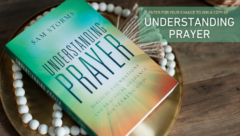This morning brings us to our fourth reading in Jonathan Edwards’ The Religious Affections. You can click here to read more about this effort. If you have not been reading with us and would like to participate, this is as good a time as any to join in. Next week we’ll begin the real meat of the book and what has come before, though important, shouldn’t hinder your enjoyment of the rest of it.
Summary
This week we finished Part III in a reading that was probably too long. Here Edwards continues laying out his signs of “nothing.” This is to say that he points out things that are often offered as proof of authentic spirituality when in reality these cannot be said to prove or to disprove faith.
These were the seven characteristics he pointed out in the first half of the section:
- Intense or high affections
- Physical manifestations
- Excessive excitement and talkativeness
- The way in which affections are brought about
- That Scripture is brought to mind
- The existence of love in the affections
- The fact that a wide variety of affections may exist
In this second part he adds to this list:
- Comfort, joy and convictions of conscience
- Spending much time in religious activity or worship
- Praising God
- Confidence in the experience of the divine
- That true Christians believe these people to be truly saved
He offers his thoughts, at some length, on each of these.
Discussion
This section, though not exceedingly difficult to read, was undoubtedly too long. Forty pages is a tall assignment when it comes to Edwards. We’ll try to keep things more manageable in the future. As much as I am enjoying the book, I am looking forward to getting to the real heart of the book starting next week. At that time we’ll turn from the negative signs to the positive ones. I am prepared for a difficult, soul-searching time! But for today, let me offer some scattered thoughts on this week’s reading.
As I read this week, I kept thinking of that so-called revival in Florida. I’ve seen many video clips of what is going on there and it is amazing how often they parallel the marks of “nothing” Edwards discusses in this book. There are high emotions and affections, physical manifestations, excitement, Scripture, joy, worship, praise, experience of God…but all of these things may mean nothing! I thought of this revival as I read Edwards words that “[God] commonly first manifested Himself in a way which was terrible, and then by those things that were comfortable.” In God’s extraordinary revelations of Himself in Scripture, He often appeared first in a terrifying way and only then in a comfortable way. Yet in what passes for revival today, we often find that God appears only in a way that seems so very human, so very comforting.
I appreciated Edwards’ talk of the sufficiency of Scripture. “Which should be enough with Christians, who are willing to have the Word of God rather than their own philosophy, and experiences, and conjectures, as their sufficient and sure guide in things of this nature.” Too often Christians, or those who claim to be Christians, force Scripture and experience into opposition with each other. And when that happens experience always seems to win. But Edwards insists, as any Protestant should, that Scripture must be our “norming norm.” We cannot allow anything to diminish Scripture’s importance or to downplay its sufficiency. As much as we love experiences of God, we must understand that these are secondary means and that Scripture is primary.
I enjoyed this brief but profound sentence: “Nor does the Spirit of God proceed discernibly in the steps of a particular established scheme, one half so often as is imagined.” Even the most serious student of God must allow that God is in no way constrained by what we think we know of Him. What He says He will do, He will do; but what He tells us is only the smallest glimpse of His character.
And finally, closer to the end of the chapter, I had to highlight this (which is a great section but should have caused Edwards to fail English class): “There are no other principles which human nature is under the influence of, that will ever make men conscientious, but one of those two, fear or love; and therefore, if one of these should not prevail as the other decays, God’s people, when fallen into dead and carnal frames, when love is asleep, would be lamentably exposed indeed: and therefore God has wisely ordained, that these two opposite principles of love and fear should rise and fall, like the two opposite scales of a balance; when one rises the other sinks.” In explanation he says, “Fear is cast out by the Spirit of God no other way than by the prevailing of love; nor is fear ever maintained but when love is asleep.” Thus a person who would seek to have assurance of his salvation must have a heart stirred by the love of God. When love is absent, it is replaced by fear, just as light, when absent, is replaced with darkness.
There are many other passages I highlighted, but these will suffice for now!
Next Time
For next week’s reading we will complete only a short section—the Introduction to Part III. In my Banner of Truth edition this runs from page 120-124. Simply read from the beginning of Part III until immediately before the first mark of truly gracious and holy affections.. This will give people a chance to catch up and will also keep us from reading an exceptionally large section the week after.
Your Turn
As always, I am eager to know what you gained from this part of the book. Feel free to post comments below or to write about this on your own blog (and then post a comment linking us to your thoughts). Do not feel that you can only say anything if you are going to say something that will wow us all. Just add a comment with some of the things you gained from the this week’s reading. To this point the discussion has been excellent!










